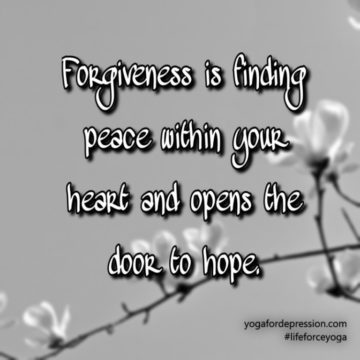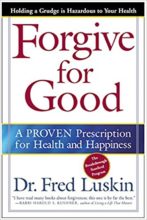
It is almost impossible to move through this world without hurting others. We are hurt, AND we hurt others. This does not mean that we, or others, are bad. It is a sign of our humanity. Sometimes offensive behavior is done out of ignorance, there is an unawareness that the behavior is hurtful. Other times we hurt or are hurt, out of anger, despair, fear, insecurity, sadness, or some other emotion. In this case, the offender knowingly harms. Forgiveness is the ability to let go of the anger, pain, sadness, resentment, etc. left by the incident. But, how do we forgive?
“Resentment is like drinking poison and hoping the other person will die.” – St. Augustine
Apologize
Forgiveness requires humility. As the offender, we must be willing to lay aside ego, accept responsibility for our actions and apologize. It is painful to know that we have hurt another and sometimes we cling to being right or defending our actions, out of a need to not feel the pain – we don’t want to be guilty. This is natural and self-preserving of our identity as a good person. The lack of admission of guilt destroys trust and relationships. We must ask ourselves, “Is being right, or perceived as a good person, more important to me than this relationship?” If it is not, it is time to apologize.
What makes an apology?
 According to Dr. Fred Luskin, a professor and forgiveness researcher at Stanford University, to be forgiven a REAL APOLOGY must have the following four parts:
According to Dr. Fred Luskin, a professor and forgiveness researcher at Stanford University, to be forgiven a REAL APOLOGY must have the following four parts:
- Admission of wrongdoing
- Recognition that the wrongdoing hurt another
- “I’m sorry”
- Commitment to make amends and/or to not repeat the offense
What happens when someone won’t apologize to me?
The struggle that we find ourselves in is that we get hurt and the offending party refuses to accept responsibility or is no longer alive. Yet, here we sit in anger, pain, and resentment.
It is time to forgive yourself for being hurt in the first place. This requires an understanding of how you feel about the incident that hurt you, diving beneath the anger. You may be upset that you put yourself in that position. “I KNEW I should not have trusted ____,” “I cannot BELIEVE that ____ did this again,” or, “How could I have not seen what ____ was doing!” We are naturally loving and trusting beings. We want to believe that others are always loving and trusting.
The reality is that anyone can behave in an unloving or untrusting manner, sometimes, and the reasons for why others hurt us are complicated. Think about the last time you were upset, and someone tried to fix your feelings for you. You might have lashed out at that person and in turn, hurt their feelings. Does that make you a bad person? No, it means that you are human. This understanding helps us to know that the person that hurts us is not always doing it on purpose. Yes, there are exceptions; sometimes, people are downright malicious.
Forgiveness is not excusing or condoning the behavior. It is about letting go of pain and finding peace within your own heart. When someone is spiteful, knowingly hurtful, forgiveness is much harder. The practice of forgiveness can still ease one’s personal pain. Sometimes a person that has caused you and others pain is simply never held accountable for it. Regardless, wouldn’t you like to be free of the pain and suffering that comes with holding onto the hurt?
The Practice of Forgiveness
- Start small – forgive someone you love for a minor incident
- Forgive the person in your heart, before you say it out loud
- Write a letter of understanding and forgiveness – you do not need to send it to the individual unless you want to
- Ask yourself what you NEED and find a way to give that to yourself or get it from a loved one
- Practice Loving Kindness Meditation
- Visualize someone that loves you unconditionally and say, or think, “may you be happy, may you be free from suffering.” Repeat this 3 – 6 times
- Visualize yourself and say, or think, “may you be happy, may you be free from suffering.” Repeat 3 – 6 times
- Visualize a loved one and say, or think, “may you be happy, may you be free from suffering.” Repeat 3 – 6 times
- Visualize a friend and say, or think, “may you be happy, may you be free from suffering.” 3 – 6 times
- Visualize an acquaintance and say, or think, “may you be happy, may you be free from suffering.” 3 – 6 times
- Visualize someone that has hurt you and say, or think, “may you be happy, may you be free from suffering.” 3 – 6 times
- Visualize someone you dislike or hate and say, or think, “may you be happy, may you be free from suffering.” 3 – 6 times
- Visualize the whole planet and say, or think, “may you be happy, may you be free from suffering.” 3 – 6 times
- Visualize yourself and say, or think, “may you be happy, may you be free from suffering.” 3 – 6 times
- Visit Dr. Luskin’s website for 9 Steps to Forgive
A Settlement by Mary Oliver
Look, it’s spring. And last year’s loose dust has turned
into this soft willingness. The wind-flowers have come
up trembling, slowly the brackens are up-lifting their
curvaceous and pale bodies. The thrushes have come
home, none less than filled with mystery, sorrow,
happiness, music, ambition.And I am walking out into all of this with nowhere to
go and no task undertaken but to turn the pages of
this beautiful world over and over, in the world of my mind.* * *
Therefore, dark past,
I’m about to do it.
I’m about to forgive youfor everything.

Beautiful article! Deeply felt and clearly articulated. Thank you for your insight, Rose.
This is a beautiful and timeless article. It reminds me of my favorite line in “Forgive”, a Trevor Hall song: “Forgiveness is a gift, so give yourself the gift from time to time”. Thanks for the reflection, Rose. Peace+